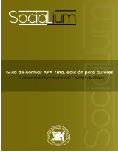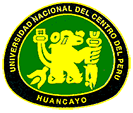Transfer of the paternal role to children (parenting) in the Chala Nueva Populated Center
DOI:
https://doi.org/10.26490/uncp.sl.2021.5.1.630Abstract
A characteristic of the Andean settlers settled in the Concepción Province, Junín Region, is the development of livestock activity; the members of the rural family are involved in it, forming family businesses. The objective of the research is to identify how the transfer of the paternal role to rural childhood (child, puberty and adolescent) (parenting) is presented. Family dynamics is formative, it promotes the development of its members, thus the infant (child, pre-pubescent, puberty and adolescents) actively participate in agricultural activities, parents move to the huts and transfer the adult role to the infant, producing the parenting. Qualitative study, of phenomenological design, shows the practices of the Andean adult on the rural parenting processes; 7 infants of both sexes are interviewed with an in-depth interview guide. The results show that parents do not make use of their obligations and inappropriately transfer duties to their children of both sexes for long periods of time, when they move to the huts according to the annual livestock calendar (mating, birth, benefits and sale of sheep and cattle); adult travel to local fairs seriously compromises the rights and the necessary evolutionary process of the child, of studying, recreation, playing, etc. It is concluded that parents engaged in livestock activities, transfer to their children, mostly women, adult obligations such as caring for their siblings, school attendance, animal care (family business) and third parties, compromising school performance and violation of their rights.
Downloads
References
Boszormenyi, I., y Spark, G. (2003). Lealtades Invisibles. Reciprocidad En Terapia Familiar Intergeneracional. Amorrortu Editores.
Bowlby, J. (1998). El apego. Paidós.
Domínguez, C., González, D., Navarrete, D., y Zicavo, N. (2017). Parentalización en familias monoparentales. Revista Ciencias Psicológicas, 13(2), 346-355. http://www.scielo.edu.uy/scielo.php?pid=S1688-42212019000200346&script=sci_arttext&tlng=pt
FondodePoblacióndelasNacionesUnidas. (2018). El enfoque basado en los derechos humanos. UNFPA. https://www.unfpa.org/es/el-enfoque-basado-en-los-derechos-humanos#:~:text=Los%20derechos%20iguales%20e%20inalienables,las%20Naciones%20Unidas%20en%201948.
Hernández, G. (2016). Parentalización: cuando un NIÑO se convierte en PADRE. Psiquentelequia : https://psiquentelequia.com/parentalizacion-nino-padre/
Husserl, E. (1988). Las conferencias de París: Introducción a la fenomenología trascendental . Universidad Nacional Autónoma de México.
Martinez, M. (2001). Comportamiento humano: Nuevos métodos de investigación . Trillas.
Minuchin, S. (1982). Familias y Terapia Familiar. Celtia S.A.C.I.F.
Muntané, J. (2010). Introducción a la investigación básica. Rapd online, 33(3), 221-227. https://www.researchgate.net/profile/Jordi_Muntane2/publication/341343398_Introduccion_a_la_Investigacion_basica/links/5ebb9e7d92851c11a8650cf9/Introduccion-a-la-Investigacion-basica.pdf
Organización Internacional del Trabajo. (2019). Trabajo infantil: qué es, causas y consecuencias. UNHCR ACNUR. https://eacnur.org/blog/trabajo-infantil-que-es-tc_alt45664n_o_pstn_o_pst/#:~:text=La%20OIT%20explica%20que%20se,su%20desarrollo%20f%C3%ADsico%20y%20psicol%C3%B3gico.
Pankseep, J. (2017). Las emociones vistas por el psicoanálisis y la neurociencia: un ejercicio de conciliación. Revista Internacional de Psicoanálisis, (7). https://www.aperturas.org/articulo.php?articulo=155
Parra, A. (2015). Las Características de la Parentalización con Famílias en condiciones de Ausencia Parental por situaciones Laborables pertenecientes al Barrio Umbría [Tesis pregrado, Universidad Politécnica Salesiana Quito]. Repositorio institucional UPS. https://dspace.ups.edu.ec/bitstream/123456789/9707/1/UPS-QT07498.pdf
Rivas, J. (1992). Técnicas de Documentación Investigación I. Universidad Nacional Abierta.
Rosado, R. (2018). Parentalización, o cuando los niños adoptan el rol de sus padres. Psicología desde el alma. https://psicologiadesdeelalma.wordpress.com/2018/09/13/parentalizacion-o-cuando-los-ninos-adoptan-el-rol-de-sus-padres/#:~:text=Cuando%20los%20roles%20infantiles%20se,conoce%20como%20parentalizaci%C3%B3n%20o%20parentificaci%C3%B3n.
Rovetta, A. (2016). El hijo parental... una carga muy pesada. Psicología Integral Uruguay. https://www.psicologiaintegraluruguay.com/2016/10/el-hijo-parental-una-carga-muy-pesada.html#:~:text=una%20carga%20muy%20pesada,-octubre%2011%2C%202016&text=El%20termino%20de%20hijo%20parental,las%20responsabilidades%20de%20un%20adulto.
Sánchez, G. (2020). Parentificación: niños que ejercen el rol de padres. La mente es maravillosa. https://lamenteesmaravillosa.com/parentificacion-ninos-que-ejercen-el-rol-de-padres/
UNICEF. (2006). Convención sobre los derechos del niño [Archivo PDF].
UNICEF. https://www.un.org/es/events/childrenday/pdf/derechos.pdf
Zamora, P. (2013). Fenómeno del hijo parentalizado en niños, niñas y adolescentes en contexto de vulneración de derechos [Monografía científica posgrado, Universidad del Bio-Bio]. Repositorio institucional UBIOBIO. http://repobib.ubiobio.cl/jspui/handle/123456789/506
Downloads
Published
Issue
Section
License
Copyright (c) 2021 Ana Manrique Canchari, Luz María Macha Guerra

This work is licensed under a Creative Commons Attribution-NonCommercial-ShareAlike 4.0 International License.








.jpg)












